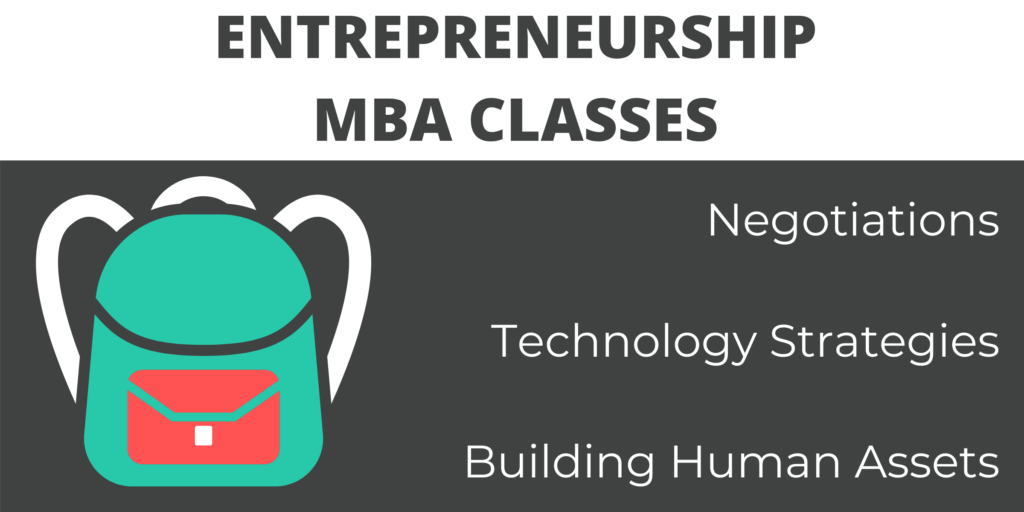In this guide we will explore the nature and definitions of entrepreneurship and the various specializations therein, as well as the most promising career outcomes and how to work towards them.
Entrepreneurship and business are inseparable both in education and in the markets of the real world. For this reason, many resources relating to business professions and education also relate to entrepreneurship. So with this in mind, we have organized our best links and resources on the subject for easy browsing.
For an in-depth look at the path leading to entrepreneurship (from an MBA program that specializes in training entrepreneurs), be sure to read on. Below we compile industry profiles for various sectors of entrepreneurship as well as advisory reflections on common mistakes and market trends. There are some surprising factors to consider, and the business landscape is ever changing–which means preparation and awareness are your best weapons in achieving success.
Entrepreneurship: General Questions and Concerns
- Entrepreneur U: Schools for Start Ups
- What Can I Do with a Master’s in Entrepreneurship?
- 101 Entrepreneur Quotes for Every Situation
- What Is Social Entrepreneurship? + How to Impact Change With Your Business Degree
- What’s The Best Degree For Becoming An Entrepreneur?
- What Makes an International Destination Business Friendly?
- The Best Business iPhone and iPad Apps
- Do You Need A Business Degree To Run Your Own Business?
- 35 Women-Owned Business Statistics You Need to Know in 2021
- 30 Best Automation Technology Tools to Level Up Your Business
- What Goes Up In a Down Economy
- Foray Into Franchising
- An Introductory Course On Starting Your Own Business
Entrepreneurship Education
- The 50 Best Scholarships For Entrepreneurs
- The 10 Best Online Bachelor’s in Entrepreneurship Degree Programs
- The 10 Best Online Entrepreneurship MBA Degree Programs
- 10 Fastest Online Master’s in Entrepreneurship Degrees for 2021
- 10 Most Affordable Entrepreneurship Master’s Degrees for 2021
- 15 Best Online Master’s in Entrepreneurship Degrees for 2021
- 25 Best Master’s in Entrepreneurship Degrees for 2021
MBA: General Questions and Concerns
- What Can I Do with an MBA?
- Can I Get an MBA With Only a Liberal Arts Degree?
- Career Outlook For MBA’s
- Closing the Gap: The Rise of Women in MBA Programs
- How Quickly Can I Get an MBA?
- How to Choose a Quality MBA Program
- How To Choose An MBA Specialization
- International MBAs Vs Domestic MBAs
- Is an MBA Right for Someone Without a Business Degree?
- Should I Get an MBA Online?
- The Ultimate MBA Guide for Military Veterans
- What Career Can I Expect With an MBA?
- What is an MBA?
Additional MBA Specializations
- What Can I Do with a Cyber and Information Security MBA?
- What Can I Do with a Healthcare Administration Master’s Degree?
- What Can I Do with a Master’s in Project Management?
- What Can I Do with a Master’s in Management?
- What Can I Do with a Sports Management Master’s Degree?
- What Can I Do With an International Business Management Degree?
- What can I Do with an IT Management Degree?
- What Can I Do with an MBA in International Business?
MBA Education: Best, Fastest, or Most Affordable
Best Programs
- 10 Best Online Supply Chain Management MBAs
- The 10 Best Online Finance MBA Degree Programs
- The 10 Best Online Human Resources MBA Degree Programs
- The 10 Best Online Marketing MBAs
- The Best Online Real Estate MBA Degree Programs
- 15 Best Online Cyber and Information Security MBA Degrees for 2021
- 15 Best Online MBA Degree Programs for 2020
- 15 Best Online MBA in International Business Degrees for 2021
- 25 Best Campus MBA Degree Programs for 2020
- 25 Best Cyber and Information Security MBA Degrees for 2021
- 25 Best MBA in International Business Programs for 2021
Fastest and Most Affordable Programs
- 10 Fastest Online Cyber and Information Security MBA Degrees for 2021
- 10 Fastest Online International Business MBA Degrees for 2021
- 10 Fastest Online MBA Degree Programs for 2020
- 10 Most Affordable Cyber and Information Security MBA Degrees for 2021
- 10 Most Affordable International Business MBA Degrees for 2021
- 10 Most Affordable Online MBA Degree Programs for 2020
- Accelerated MBA Programs
What is a Career in Entrepreneurship?
When someone states that they work in ‘business’ it can mean almost anything. Likewise, many prospective entrepreneurs may have trouble pin-pointing exactly what entrepreneurship really means. Not all entrepreneurs start companies, in fact, many focus entirely on the buying and selling of existing commercial enterprises or assets.

Other entrepreneurs focus entirely on investment from the sidelines, seeding various startups in a role many refer to as venture capitalist. Other entrepreneurs put their eggs in one basket, and devote their professional lives to seeing one venture through to its highest level of success. Conversely there are entrepreneurs who refer to themselves as social entrepreneurs who work to enact construct change in one’s social environment.
In other words, there are probably as many different types of entrepreneurs as there are actual entrepreneurs. This is not to knock the profession by any means–in fact, the entrepreneurial spirit is at the heart of the American ideal. And the sheer flexibility of this profession is representative of the beauty of a free market economy where anyone can step up to the plate to forge a rags to riches story.
Unfortunately though, many entrepreneurs find themselves in perpetual proverbial rags as entrepreneurial efforts are notoriously fraught with hardship and failure. It is poetic justice in some sense however, that the most lucrative and socially enviable profession is also the most challenging and arduous. So with this in mind, a solid education is all the more crucial for those interested in walking the path of the entrepreneur.
What is the Education for an Entrepreneur?
The appropriate education for an entrepreneur has more to do with the strengths and weaknesses of the individual, rather than meeting some formal educational requirement as is the status quo for many professions. In entrepreneurial pursuits rather, professionals are measured by their results more than their degree holdings or alma mater.

As described in the section above the various paths of entrepreneurship are countless and the gaps between them are respectively vast. Because of this, the particular form that the education of entrepreneurs takes is–as one might expect–entirely dependent on one’s chosen destination within the entrepreneurial sector.
For instance, a venture capitalist might spend the bulk of education learning the ins and outs of quantitative finance, budgeting, and accounting, so that he or she is prepared to effectively manage investments in the world of ever-changing markets and economic fluctuations. On the other hand, an entrepreneur of social change might spend the most time studying social psychology, public administration, and other social sciences.
So, if these programs can take so many different shapes and cover vastly different subjects, how do students count on receiving the education that best matches individual career goals and entrepreneurial aspirations? Well, the unfortunate answer is that they cannot.
The Drop in Entrepreneurship among MBA Graduates

Entrepreneurship is already a notoriously arduous path to walk, but misleading education programs might be playing a bigger hand in that than we might have previously assumed. According to research reported by the Financial Times, the number of startups founded by MBA alumni fell at 27 of 40 leading business schools, measured over a three year period.
This measurable drop in startup activity among alumni groups is surprisingly severe at even the most prestigious of business programs. Stanford, MIT, and Babson College (whom US News & World Report ranked as the #1 entrepreneurial program) all demonstrated whopping drops of 14% to 15% in startup ventures among MBA graduates. Astonishingly, this drop is mirrored in MBA programs around the world.
Astute readers will call to mind that the entrepreneurial space has never been more crowded. Rates of entrepreneurship in America have been trending upwards for over 20 years, and now roughly 15% of the adult population is an entrepreneur (Entrepreneurship.babson.edu, 2019). So why are the most well-educated and professionally groomed MBA graduates not launching startups?

Well the answer is implied in the setup of the issue. The entrepreneurial space is crowded. With 15% of the adult population staking a claim to the entrepreneurial profession, there is more competition than ever before–competition for investors, competition for leases and physical assets, but most impactful of all is the competition for a chunk of consumer attention.
All you need to do is scroll the feed of one of your social media accounts to be veritably barraged by an onslaught of product promotions and branding plays. MBA graduates are no longer the only people savvy enough to launch products in niche markets. Anyone can sell anything from the comfort of their own home, and in many cases the risk associated with entrepreneurial efforts simply does not match the investments of time and money associated with earning a top-tier MBA degree. In other words, MBA graduates are simply finding it more profitable to go in another direction.
What is an Entrepreneurship MBA?

If the above section was discouraging, don’t worry. An Entrepreneurship MBA is designed specifically to counter the issues mentioned above. While graduates from MBA programs might be starting less businesses, graduates from Entrepreneurship MBA programs are starting more companies and engaging in more entrepreneurial ventures.
One of the problems with the traditional MBA curriculum is that it is rather rigid in terms of a set curriculum with little room for divergence from scheduled coursework. And for entrepreneurs whose success depends entirely on their ability to prepare and plan for a totally unique model of business this can be detrimental. Entrepreneurs need the freedom to specialize in niche markets, unique business models, and the freedom to investigate original business queries.

So the purpose an Entrepreneurship MBA is twofold:
One, to offer an entrepreneurial education couched in a top-tier MBA curriculum so that students learn the fundamentals of business that are of universal value to all business ventures. This helps mitigate the all too common issue of entrepreneurs engaging in business practices which they are unprepared to succeed at, while also providing the credentials to please prospective investors and business partners.
Second, these programs are designed to offer the flexibility and self-direction that allows students to build the unique expertise needed to excel in one’s particular venture. These programs typically offer a host of elements meant to bolster students’ entrepreneurial abilities. Here’s a breakdown of some of the unique offerings you can expect:
- A host of course electives representing key factors of entrepreneurial ventureship
- A faculty trained and successful in the art of entrepreneurship
- Faculty often offer extensive professional networks to their students
- Opportunities for research or internship at startup incubators, investment groups, and venture capitalist companies
- Build-your-own curriculum options (some programs have these, some do not)
- In-depth examinations of various business models–what works, what doesn’t
- Extensive catalogue of entrepreneurial resources–tools, organizations, and general strategies
- Investigation of most promising established industries as well as burgeoning industries
- Program specializations meant to prepare students to excel in niche markets
Entrepreneurship in 2021 and Beyond

As one will know from a quick assessment of the headlines in circulation at this time, small business and entrepreneurial ventures have been among the heavily damaged areas of the American economy resulting from the worldwide pandemic. State lockdowns have led to a tremendous strain on the food and service industries, and even where states remain open there is a tremendous level of struggle.
But not all is doom and gloom for the entrepreneur. Many sectors of the market are experiencing explosive growth, and where there is the opportunity for growth there is opportunity for entrepreneurship. Before we get into the particular market trends presenting today, let’s look at some general statistics that paint a vivid picture of the entrepreneurial markets of the world today:
- Roughly 60% of billionaires in the US are self-made
- A third of entrepreneurs hold only a high school diploma
- An estimated 67% went to college and/or graduate school
- Less than 10% hold a Bachelor’s of Business
- Around 25% of entrepreneurs are self-employed full-time
- The most self-employed entrepreneurs work in trade skills or construction
- More than a quarter of entrepreneurs report the most motivating factor is being one’s own boss
- 25 million Americans were starting a business, or were already running one in 2016
- As of 2019, roughly 16% of the adult population in the US is an entrepreneur
- The number 1 reason why startups fail is that there is no market demand
- About 60% of entrepreneurs are between the ages of 40 and 60
- Nearly a quarter of all businesses will fail in their first year
- Conversely, more than 60% of adults believe entrepreneurism is a good career
- Studies suggest that middle-aged men start the most successful businesses (Data from MIT Sloan)
- With a Global Entrepreneur Index of 83.6, the US is the best country for entrepreneurs
- Nearly 83% of business owners started their own companies
- More than 60% of small businesses have no staff
Due to the pandemic however, the picture painted above may be in a state of rapid change and entrepreneurs–both prospective and current–should maintain stringent awareness of market activities, particularly those of potential impact to one’s particular venture.
COVID-19 and Entrepreneurship
While many discussions concerning business and the pandemic might suffice with a warning of caution, the impact on entrepreneurship is decidedly more severe and thus warrants some deeper inquiry:
- Overall downturn in the global economy
- Roughly 40 million unemployed in the United States
- State lockdowns have drastically lowered consumer mobility
- Health concerns shatter consumer engagement with food and service industries
- Unemployment and financial woes are dropping consumer spending overall
- Investors are less likely to make risky investments
- A rush to make ‘safe’ investments is decreasing profitability
- Productivity in manufacturing operations and supply chains are plummeting
As mentioned above though, this shift in the economy has opened the door to opportunities in other areas. Many entrepreneurs are working to capitalize on the unique climate of consumer needs and interests during this trying time. Specifically, businesses in these sectors are demonstrating remarkable success.
- Cleaning Services
- Delivery Services
- Drive-in Movie Theatres
- Remote Entertainment (Movies & Videogames)
- The Book Industry
- Grocery Stores
- Liquor and Wine Stores
- Meal Preparation & Delivery
- Canned and Jarred Goods
- Fitness Equipment
- Landscaping and Yard Care
- Coffee Subscription
- Mask Manufacturing
- Telehealth Services
- Tutoring & Online Education
- Used Automobiles
- Behavioral & Mental Health Services
- Nutritionists and Dietitians
- Supplement Companie
Entrepreneurship MBA Specializations
An Entrepreneurship MBA already represents a specialized MBA degree track, so it is uncommon for schools to offer specialized Entrepreneurship MBAs. Rather students will more commonly have the opportunity to engage in an additional specialization, but whether this specialization will be formally recognized in the degree program will depend on the particular school policy.
But it is important to note that virtually any MBA specialization could be immensely helpful, depending on a student’s desired path. In some cases, it might even be more beneficial for a prospective entrepreneur to choose an MBA specialization other than entrepreneurship. In any case investors and prospective partners love to see a specialized background in areas of high-demand. According to the Princeton Review these are 9 of the most demanded MBA specializations:
- General Management
- International Management
- Strategy
- Consulting
- Finance Leadership
- Entrepreneurship
- Marketing
- Operations Management
- IT Management
Entrepreneurship MBA Versus Master’s of Entrepreneurship
There is an important distinction to make between an MBA of Entrepreneurship and a Master’s of Entrepreneurship. Many suggest the popularity of the latter to be responsible for the dropping rates of entrepreneurial ventures among MBA graduates. The problem is that a Master’s of Entrepreneurship places vastly more responsibility on the students’ shoulders to know what they should study.
While the best Master’s of Entrepreneurship programs work hard to provide students with the most valuable and insightful curriculums, many of them are positioned as a ‘build-your-own’ curriculum. This approach can be tremendously valuable for some students–those who excel at self-management and self-direction–and tremendously detrimental to other students, those who prepare to be advised and guided in the right direction.
Entrepreneurship MBAs and Small Business
For those consulting this guide in the interests of pursuing small business there are several points to make. While an MBA of Entrepreneurship or a similar degree is always helpful to an entrepreneur looking to launch a small business venture or improve an existing one, the degree is not always necessary.
As mentioned in the statistics profile above, roughly one third of entrepreneurs hold only a high school diploma. One argument against advanced education is that there is an opportunity cost to consider. While you will certainly enter the job market more prepared after graduation, you could have also spent that time actively working towards your goals in the job market–seeking investors, building partnerships, fine-tuning business models.
In no other profession is the age old adage Know Thyself more relevant. To excel as an entrepreneur you need to really know yourself–your strengths, your weaknesses, and where you want to go. Until one has that knowledge, a large portion of one’s effort will be wasted.
Entrepreneurship Industry Profile
One of the most interesting and stable metrics to consider when parsing the health of entrepreneurial markets is the data surrounding the expansion of self-employment within a given industry.
This line of inquiry can produce some counterintuitive conclusions–for instance, many of the economy’s most rapidly shrinking job markets are actually growing in sectors of self-employment. Consider this profile established by the Bureau of Labor Statistics:
- Farmers, ranchers, and other agricultural managers
- Employment as of 2012: 680,500
- Projected Employment by 2022: 499,100
- Employment growth from 2012 to 2022: -26.70%
- Rate of Self-Employment: 73.10%
- First-line supervisors of retail sales workers
- Employment as of 2012: 390,800
- Projected Employment by 2022: 333,100
- Employment growth from 2012 to 2022: -14.8%
- Rate of Self-Employment: 24.4%
- Childcare workers
- Employment as of 2012: 374,100
- Projected Employment by 2022: 447,400
- Employment growth from 2012 to 2022: 19.6%
- Rate of Self-Employment: 28.5%
- Carpenters
- Employment as of 2012: 325,400
- Projected Employment by 2022: 373,300
- Employment growth from 2012 to 2022: 14.7%
- Rate of Self-Employment: 36.1%
- Construction managers
- Employment as of 2012: 275,000
- Projected Employment by 2022: 297,300
- Employment growth from 2012 to 2022: 8.1%
- Rate of Self-Employment: 56.7%
- Hairdressers, hair stylists, and cosmetologists
- Employment as of 2012: 254,500
- Projected Employment by 2022: 284,700
- Employment growth from 2012 to 2022: 11.9%
- Rate of Self-Employment: 41.6%
- Landscaping and groundskeeping workers
- Employment as of 2012: 253,300
- Projected Employment by 2022: 285,700
- Employment growth from 2012 to 2022: 12.8%
- Rate of Self-Employment: 22.5%
Prospective entrepreneurs can really get a head start by positioning themselves for work in one of the above listed industries. These industries are most receptive to self-employed professionals, and will even allow students to begin building entrepreneurial experience early in life or while still in school.
Carrie Morris
Author
Warren Dahl
Editor-in-Chief

